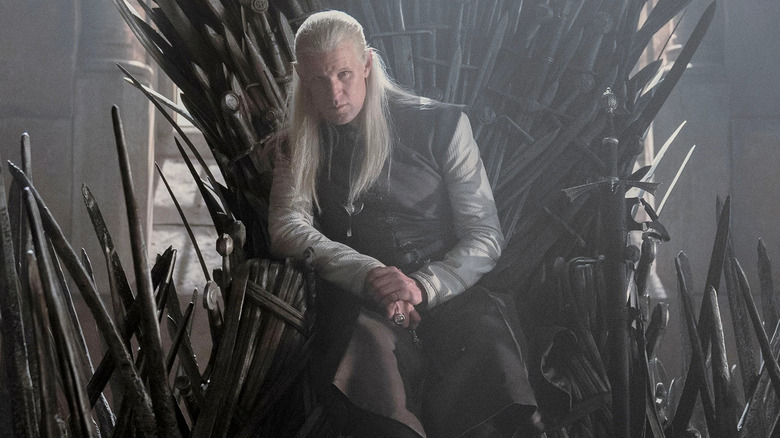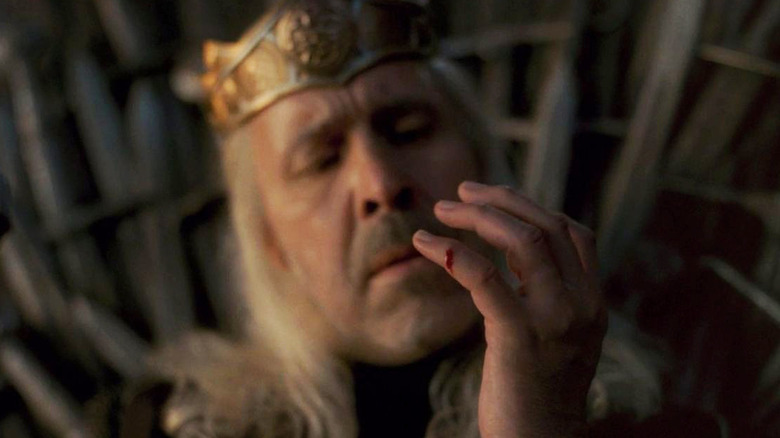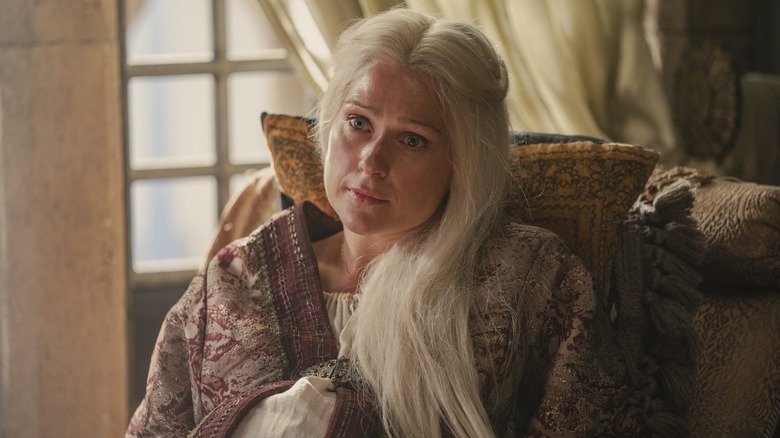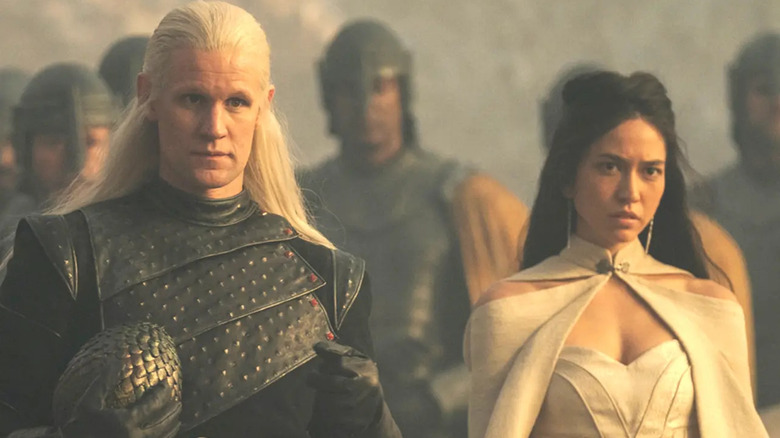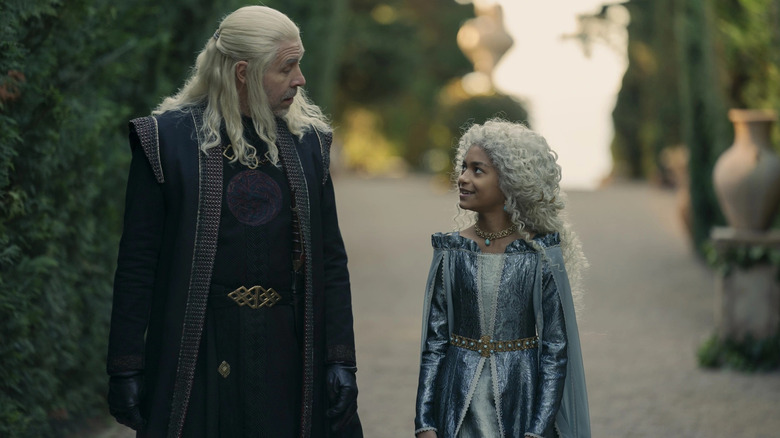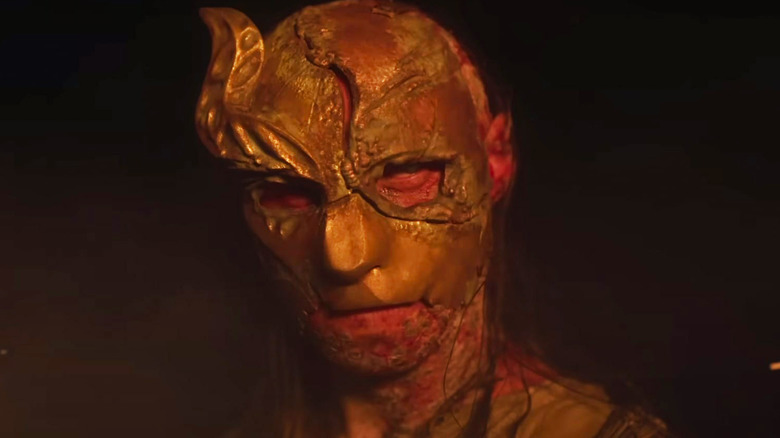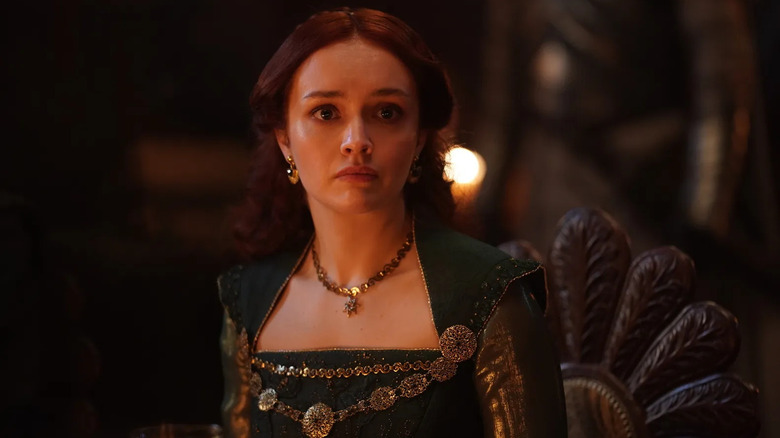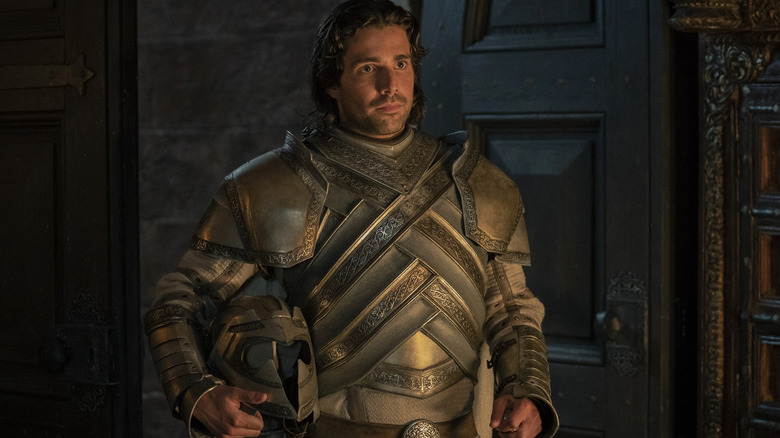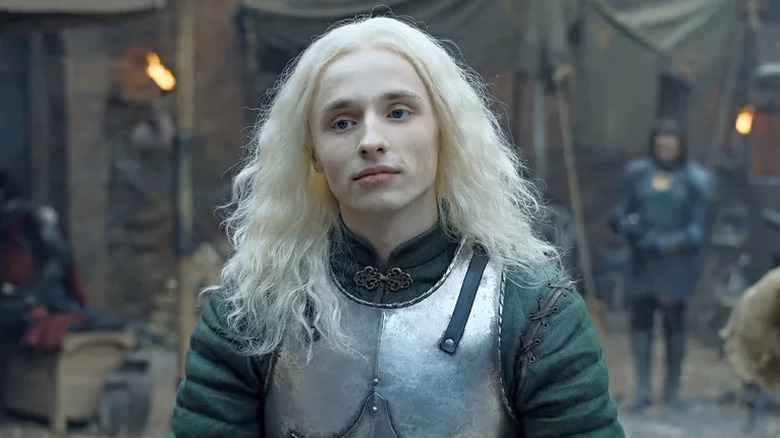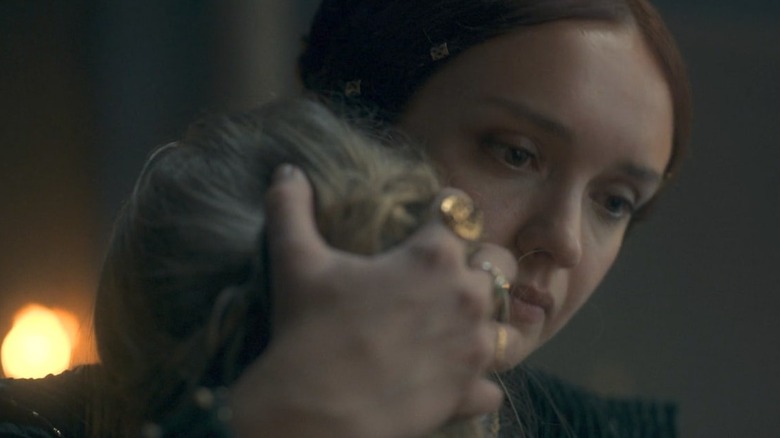The Most Uncomfortable Moments In House Of The Dragon Season 1, Ranked
George R.R. Martin loves to make audiences cringe. Martin's "Game of Thrones" books and the massively successful HBO series the universe inspired — "Game of Thrones" and "House of The Dragon" to date, with more to follow — are rich with subversive and flinch-inspiring moments. Consider the former's gasp-inspiring pilot finale. Yes, the images of Jaime and Cersei Lannister (Nikolaj Coster-Waldau and Lena Headey) engaging in coitus were shocking. Seeing Jaime push Bran Stark (Issac Hempstead Wright) out a window? Even more so.
But neither is the scene's most crucial or resonant moment. That honor goes to Jaime's tossed-aside utterance of, "The things I do for love," before his hands cast Bran toward paralysis. There's a whole world of uncomfortable to be unpacked in those six words. Jaime loves his sister and is willing to murder for her, and the casualness with which he dispatches of a child (plus the drollness of Coster-Waldau's line delivery) are infinitely more unsettling and interesting than the lurid acts themselves.
Discomfort kept "House of the Dragon" interesting from week to week. Moments that made the audience squirm revealed the subtext of characters' hearts and heads and, possibly in 2024, will hopefully return to fill the show's second, likely doom-laden season. For now, here are the most uncomfortable moments in "House of the Dragon" Season 1, ranked chronologically.
9. The treatment of Viserys' wounds, part one
"Game of Thrones" is full of horrifying moments. Pick your poison: are you more revolted by the "golden crown" of hot, molten metal that Khal Drogo (Jason Momoa) pours on Viserys III Targaryen's (Harry Lloyd) head, or the literal poisoning of Joffrey (Jack Gleeson)? There are plenty of options. But "Game of Thrones" didn't dip into the sub-genre of body horror with as much zest as "House of the Dragon," which elicits season-long cringeworthy moments on multiple levels through Viserys I Targaryen's (Paddy Considine) ailments.
To be clear, it's not Viserys' ailments alone that are upsetting. Yes, the wounds on the King's back (which come from sitting on the Iron Throne) are upsetting in and of themselves. Even more discomforting, though, is the wounds' refusal to heal and the shrugging treatment they receive from Viserys' advisers. Amputating fingers and open sores, it seems, are a pitfall of being King. Do Viserys' wounds mean the throne is displeased with his decision-making? No time to consider that. There's the line of succession to deal with and a Crab Kings to battle.
Any number of scenes in "House of the Dragon" was more viscerally filmed or upsetting to watch (see: Daemon bashing his wife's head in with a rock), but the ailing health of Viserys was so uncomfortable it kept me up at night. Besser van der Kolk's "The Body Keeps the Score" posited that overwhelming experiences affect the brain, mind, and physical body of any individual. Considering the next entry on this list, it's no wonder Viserys is falling apart.
8. A childbirth gone horribly wrong
The phrase "traumatic childbirth" wouldn't accurately summarize Season 1 of "House of the Dragon." That said, it comes fairly close. Deeply upsetting sequences of birthing and their often fatal consequences were a cornerstone of all 10 episodes, be it adult Rhaenyra (Emma D'arcy) being introduced to audiences in the middle of an agonizing labor to Laena (Nanna Blondell) sacrificing herself to a dragon instead of bleeding to death during the birthing process.
Both these scenes are heartbreaking and stomach-churning, though neither is embarrassing. "House of the dragon" postulates that the act of bringing a child into the world is womankind's battlefield. In this sense (and others), Rhaenyra and Laena are warriors. The birth sequence in "House of the Dragon" that's uncomfortable really stems from the awkward and deeply shameful behavior that comes courtesy of Visyris (Paddy Considine).
Queen Aemma (Sian Brooke) reaches a dangerous impasse in her child-birthing process in the show's fiery first episode. If the doctors perform an "emergency" c-section, they will give the King his long-awaited son at the expense of Aemma's life. If they don't, the baby will die. Aemma has no say in this decision and, in a truly cringe-inducing moment, the decision to spare or end her life is made within her earshot. Is Aemma too out of it to hear Visyris' scheming? More than likely. Does it matter? Not at all. If prioritizing his unborn son over his wife didn't make it clear enough, the lack of respect shown to Aemma at this moment is wildly upsetting.
7. Daemon and intimacy
Speaking of uncomfortable, let's discuss Daemon (Matt Smith) and sexual intercourse. Daemon's inability to perform isn't as embarrassing as "House of the Dragon" makes it out to be (E.D. and performance anxiety are common, treatable conditions, fellas!). If anything, his frequent failure is a window into the psyche of a preening and overly confident antihero.
What is cringeworthy about Daemon and sex in "The Heirs of the Dragon" episode is that he invites the citizens to watch him take Mysaria (Sonoya Mizuno) shortly after beheading and de-genitalizing members of the populace. If you don't think that's discomforting, please read that sentence again. Few events could be more embarrassing or awkward than actual death followed by the failure of a little death. If you open the Oxford English Dictionary and look up "cringe," this NSFW moment should play on a loop.
But it's not the only one Daemon anchors in this episode. Before Daemon potentially nicknames Viserys' unborn child "the heir for a day," he pauses the orgy he is at to give a toast. That means everyone pauses what they are doing, whatever that might be, including a couple freezing mid-lovemaking to hear Daemon pontificate; embarrassing. This could not be more awkward if it tried to be. As an actor, I kept thinking of how many takes these extras had to do in this scene (including during Matt Smith's close-ups!) and shuddered all over again. The cringe is the devil in this sequence's details and, in the instance of this couple, there is hell to pay.
6. Young Laena makes a play for Viserys' hand
The politics of intercourse run headlong into the politics of succession throughout "House of the Dragon." That isn't so surprising. Bearing children and extending the bloodline (and with whom one chooses to do either) are necessary components of royal succession — that means the birds and bees are, too. But that doesn't make a crucial moment involving bedding and queen-taking in "The Rogue Prince" any less disturbing.
Midway through the second episode of "House of the Dragon," Viserys walks with the young (and later doomed) Laena Velaryon. Lord Valeryon (Steve Toussaint) hopes the two will wed and consolidate both houses' power into one super-family. Laena makes a savvy play as they stroll. "Your grace," she intones, "it would be a great honor to join our houses as they were in Old Valyria." Viserys intuits that her father instructed the girl to offer him this platitude and swiftly adds, "And what did your mother tell you to say?" Laena responds, "That I wouldn't have to bed you until I was 14."
Everything about revelation is cringe-inducing. It confirms what the sequence suggests up until that point — that everyone involved, save Viserys, is remarkably comfortable with the strategic sexualization of a prepubescent girl. It isn't personal. It's about power. And that makes the moment all the more uncomfortable, never mind that Laena betrays little discomfort in the delivery of her sex-related selling point. The moment isn't the show's most upsetting, but it lingers in the mind all the same.
If you or someone you know may be the victim of child abuse, please contact the Childhelp National Child Abuse Hotline at 1-800-4-A-Child (1-800-422-4453) or contact their live chat services.
5. The loyal, sad life of Daemon's foot soldier
"House of the Dragon," tells an epic story of scheming nobles, but it never totally loses sight of those impacted by their plotting. It keeps one eye trained on the kingdom's ground-level subjects, sometimes with upsetting results. In the opening of "Second of His Name," there are more cringe-inducing moments than one could shake a stick at.
In this instance, maybe a "sword" is more appropriate than a "stick." "Second of His Name" begins amongst the wreckage of the Crabfeeder and Velarya at war. A Velaryon Knight (Aron von Andrian) is tortured by Prince Drahar as he hurls obscenities in the royal direction. None of them are printable here. Nor is the torture, which involves nails and hands and crabs crawling towards (possibly into) open orifices. The violence of this moment, its invasiveness, is disturbing enough to make the sequence worthy of this list. What follows puts it over the top.
The Knight witnesses Daemon swooping into battle on his dragon to turn the tide of the skirmish. His face lights up with hope. "Hail Prince Daemon!" the Knight cries, "Here, my prince. Save me." Daemon doesn't. He lands his dragon right on the Knight, killing him instantly. Daemon never even sees the Velaryon Knight, nor is death an afterthought for the show. This man, for all his hopes and dreams and worship of the royals he served, was all too expendable. That's agonizing of the highest order.
4. The treatment of Viserys' wounds, part two
If you've seen "House of the Dragon" and are reading this list, you suspected "the sponge bath" scene was coming. Sponge baths, devoid of context, threaten to be instantaneously awkward. There are so many opportunities for them to go wrong, from inappropriate sexualization amidst excessively splashing water to the literal hand-wringing of swabs. There's little comfort in either of those and yet the sponge bath Alicent Hightower (Emily Carey) gives her ailing husband King Viserys (Paddy Considine) is more discomforting than one could ever imagine.
I should revise my previous statement: Alicent Hightower does not give Viserys a sponge bath. She does this despite her being the Queen of all of Westeros. That's a degradation of her royal status and the fact that slovenly care is almost presupposed of Alicent is horrific in and of itself. That isn't where the scene's unpleasantness ends, though. There's also the matter of Viserys' ever-worsening wounds and open sores, which now deliver wince-inducing pain at the mere touch of soapy water.
Finally, there's the issue of what the sponge bath and care wind up being in service of. Following this already awkward moment, Alicent retreats to her bed chamber where she waits for the King to call on her. When he does, they will make love. It is that transactional. It is dismissive of Alicent's passions or mood or mental state. The shot of Alicent alone in her room in bed, time ticking by, is as wince-inducing as soap on a sore.
3. Rhaenyra toys with Ser Criston Cole
That same evening, though, an equally cringe-worthy moment occurs. It'd be easy to label Rhaenyra (Milly Alcock) hooking up with her cousin Daemon (Matt Smith) as awkward. It is, objectively. In the world of "Game of Thrones?" Not so much. Incest is an act that longtime viewers or readers of George R.R. Martin's work are (strangely) used to, and the Cosmopolitan controversy surrounding coverage of the show's interfamily indecencies is reflective of that fact. What's far more unsettling (on "Game of Thrones" own terms), is the way Rhaenyra flirts and toys with Ser Criston Cole (Fabien Frankel) in the wake of hooking up with Daemon.
Ser Criston Cole is Rhaenyra's personal guard. He quite literally serves her. When Rhaenyra invites Ser Criston into her room and begins to flirt with him, the end result is carnal passion. Before consummation, though, the foreplay inspires winces. Rhaenyra ostensibly abuses the power dynamic between the two. What she sees as playful is actually deeply controlling. Cole's status as a knight and any power he has acquired by serving her, and his rise through Westeros' class system, is at risk throughout their encounter.
To Rhaenyra, the moment is empowered and realized sexuality. For Cole, it's potentially life or death. The fallout from this act (Cole murdering Lonmouth, an alliance between Alicent and Criston) only confirms the gravitas of Rhaenyra's actions, which are completely oblivious to her at the moment. The more one considers it, the harder it is to stomach.
If you or anyone you know has been a victim of sexual assault, help is available. Visit the Rape, Abuse & Incest National Network website or contact RAINN's National Helpline at 1-800-656-HOPE (4673).
2. The funeral
As /Film's Sandy Schaefer eloquently put it, "'House of the Dragon' is at its best when it creates a slow burning powder keg." Very few characters on this show like each other (even when they love each other), and forcing them to interact can be as tension-rich as any battle. That proves especially true during the funeral sequence in episode seven, "Driftmark."
Lady Laena Valeryon is dead and the Targaryens, Hightowers, and Velaryons all attend her funeral service. This is both the right decision and a massive mistake. These are families who have double-crossed and stabbed each other in the back (both literally and metaphorically) and every resentment and grudge they have is barely contained under the surface of their grieving. It is the ultimate powder keg of teeming over hate and bile.
Aegon (Tom Glynn-Carney) uses it as an excuse to remain insufferable and let his hormones run wild as boars mid-hunt. Daemon (Matt Smith) feels compelled to chuckle snidely throughout. And that's to say nothing of the withering glances cast between rivals and allies alike, which give new meaning to the phrase "staring daggers." The dinner table sequence in the show's eighth episode might also be awkward, but it's the funeral in "Driftmark" that is truly a feast of cringe.
1. A few coins for your troubles
"House of the Dragon" gets less awkward the longer it goes on, in no small part because the audience adjusts to the characters' behaviors and the show leans into its soap opera tendencies as the season races towards its finish. It's not without its moments, though. Viserys' wounds are reliably disgusting (by episode eight, his skin and teeth are rotting to a degree that would make a Stephen King vampire blush) and the fallout of Aegon's (Tom Glynn-Carney) assault of Dyana (Maddie Evans) is unsettling to the highest degree.
The assault is awful enough. But, again, this is the world of "Game of Thrones" we're talking about. Shocking sexual violence and acts are par for the course. What makes "House of the Dragon" thrilling is how it finds ways to empathetically hit these awful story points without lessening their impact.
Case in point: we don't see what Aegon does to Dyana so much as witness the aftermath. Dyana is shaken to her core, her face robbed of all color and her character all but absent. That's upsetting in and of itself. What makes it worse is that she is given "a few coins for her troubles" and the same herbal Plan B that was fed to Rhaenyra so many years ago. The casualness with which Dyana's trauma and pain are addressed and Aegon's cavalier privilege is as disturbing as any moment the show stages in its first season.
If you or anyone you know has been a victim of sexual assault, help is available. Visit the Rape, Abuse & Incest National Network website or contact RAINN's National Helpline at 1-800-656-HOPE (4673).
